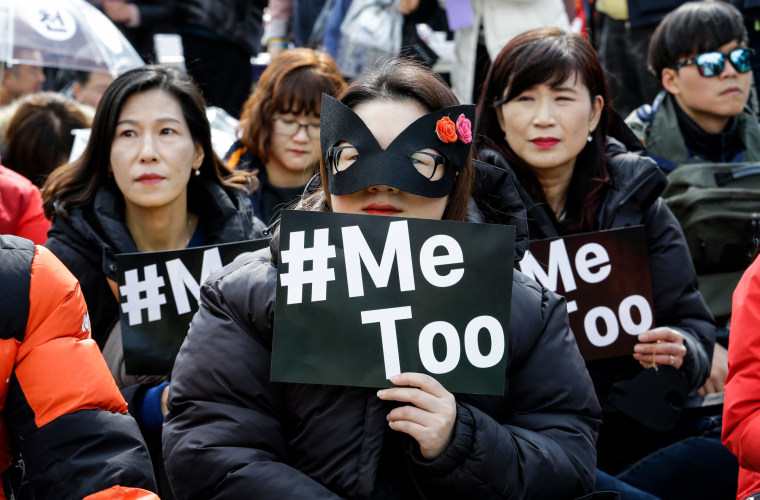Trump re-election sparks interest in South Korea’s ‘4B’ movement among American women
The election of Donald Trump as the next U.S. president has triggered a surge of social media posts and internet search interest in South Korea’s fringe feminist “4B” movement, which calls on women to refrain from dating, having sex with men, having kids and marrying men.
Across TikTok, dozens of American women disappointed by Tuesday’s election results have posted videos stating their intention to participate in their own version of the 4B trend. There were over 500,000 search inquires for “4B movement” on Google over the span of 48 hours this week, and it became one of the top trending topics on the online search engine.
The 4B trend, which began in South Korea 2018 in the wake of the #MeToo movement, has become a way for some women to protest misogyny, gender discrimination and violence against women, according to Meera Choi, a Ph.D. candidate in the department of sociology at Yale University who studies heterosexual refusal among South Korean women.
“Women started thinking about how the government and the state and the men are failing them,” said Choi, and they subsequently began “not rewarding men by not participating in heterosexual relationships.”
Women started thinking about how the government and the state and the men are failing them.
Meera Choi, Ph.D. candidate at Yale University
The renewed interest in 4B comes in the aftermath of an election in which gender played a major role. Some thought that questions about the future of women’s reproductive rights would turn voters out for Vice President Kamala Harris and deliver Trump a crushing defeat — instead, women ended up gravitating toward him. Harris won women by 8 percentage points, while President Joe Biden won that cohort by 15 percentage points in 2020, according to NBC News’ exit polling.
Still, for many women, Trump’s win was an indication that their reproductive rights are dwindling.
Trump has varied on his stance on a nationwide abortion ban, previously supporting legislative efforts to institute one and also saying that the issue should be determined by the states.
While Harris had a strong female support base, Trump ultimately connected more with voters on his promise to fix the economy and to be different from the current administration, helping him take the lead nationwide.
Data from NBC News’ exit polling as of Thursday afternoon showed that among women, who made up 53% of the electorate, 53% voted for Harris and 45% for Trump. Of the female voters, 91% of Black women voted for Harris vs. 7% who voted for Trump, and 57% of college-educated white women voted for Harris vs. 41% who voted for Trump. Among white female noncollege graduates, only 35% voted for Harris vs. 63% who voted for Trump.
Among men, 42% voted for Harris and 55% for Trump. Of the male voters, 37% of white men voted for Harris vs. 60% who voted for Trump, and 47% of college-educated white men voted for Harris vs. 50% who voted for Trump. Among white men without college degrees, only 29% voted for Harris vs. 69% voted for Trump.
American women who remain disillusioned with the government and Trump’s win are now “channeling that anger and channeling that hopelessness into this new activism within their private sphere where they boycott men and boycott heterosexual relationships, and [refuse] to participate in patriarchy as a way to cope,” Choi said.
South Korea is in the midst of what some scholars have dubbed a “gender war,” in which concerns about inequality have stirred a deep gender divide that has become a core part of the country’s national politics. In 2022, President Yoon Suk Yeol, blamed feminism for the country’s low birth rate, saying he would increase penalties for false accusations of sexual crimes, and denied the existence of “structural discrimination based on gender.”
That has in turn sparked movement among feminists in the country to ring alarm bells over their rights, including an embrace of the 4B movement. While Choi described 4B as relatively niche, she said she has found that many women have resonated with the idea of using their reproductive choice and bodily autonomy to respond to anti-feminist sentiment and policies in the South Korean government.
The 4B movement has been gaining more interest and popularity on an international stage in recent years, particularly as young women across the world have learned about it on social media, according to Choi.
Aleisa Mora, 30, posted a TikTok about the 4B movement in March after reading the English translation of the book “Kim Jiyoung, Born 1982” by Cho Nam-Joo, which is largely credited as the book that began the 4B movement.
Mora’s original video, which she has reshared following the U.S. election, has amassed more than 5.9 million views and stirred backlash from some men. She said her posts have ended up on far-right corners of the internet, where men have wished harm on her. However, she said those comments only underscore her belief in why the 4B movement is needed in the United States.
“We have tried reasoning,” she said. “We’ve tried being very mindful, very demure, talking to people about how to treat us right but that’s not working.”

“Now that we don’t need a man for anything, and men continue to actively take our rights away, we’re just like, ‘OK, we’re just not going to deal with you,’” Mora added.
Marykate Cecilia, who made a TikTok about the 4B movement after the U.S. election, said she believes South Korean women’s efforts to boycott men is working in their favor.
“It’s working because the government is worried about the population size decreasing,” said Cecilia, 22, referencing South Korea’s low fertility rate, which fell to 0.78 in 2022 from 0.81 the previous year, according to World Bank Group data. There is no data that indicates the 4B movement is a factor in the decline.
“Maybe nothing changed immediately, but now it’s actually a problem that they have to address,” Cecilia said.
But 4B is a flawed movement, Choi said, as it can often exclude women who do not fit into its particular definition of feminism, including transgender women, married women and women who have children.
The cultural differences between the U.S. and South Korea, such as how diverse versus monoracial the societies are, respectively, could also impact what a 4B movement would look like among Americans.
For women like Cecilia, seeing 4B continue to build momentum is still enough of a motivating factor to continue posting about the trend and partaking in it.
“If enough women decided that that was, you know, possible, it would be great to actually see some change happen,” she said. “And to see that women are important.”





